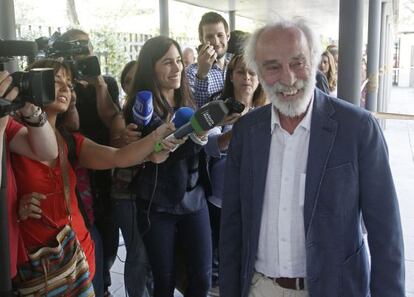Singer accused in court over crucifix cookery stunt
Christian association’s complaint centers on short film made over 20 years ago

Javier Krahe, a veteran singer-songwriter who is often compared with Georges Brassens, sat in court on Monday to be tried for a crime against religious feelings that he allegedly committed back in 1978.
The 68-year-old artist said that if found guilty, he will “go into exile in France.”
In 1978, Krahe and a colleague created a humorous short film called “Cómo cocinar un crucifijo” (or, How to cook a crucifix), in which the Christian symbol was taken apart, buttered, covered with herbs and placed in the oven. A voice recommended leaving it there for three days, after which it would be done to a turn.
Some of those images were used for a 2004 interview with Krahe on the television program Lo + plus, which aired on the private network Canal +. A Christian association called Centro Jurídico Tomás Moro then filed a complaint claiming the film offended religious feelings as per article 525 of the Penal Code.
This hearing makes no sense and we should take care that we don’t all turn into the Taliban”
“They didn’t understand me,” said Krahe, who is known for his ironic and irreverent lyrics. A major figure of Madrid’s Movida – a countercultural movement of the 1980s whose members included filmmaker Pedro Almodóvar -- Krahe stated that he will continue to make songs about the Church, but that he will always write many more songs about girls. The average, he said, is “nine songs about girls for every one about the Church.”
Waiting for him outside the courthouse in Colmenar Viejo, outside Madrid, were a group of friends and sympathizers that included El Gran Wyoming, a television humorist who also testified in the trial. Other celebrities such as film director Alex de la Iglesia and singer Miguel Ríos remained inside the courtroom for the duration of the trial to show their support.
El Gran Wyoming has publicly suggested that Krahe should be “sentenced to pray three Hail Maries instead of the fine,” which could be as high as 144,000 euros. He also called the whole trial “absurd” and said that “we are increasingly returning to the Inquisition and not even because of what you say now, but because of what you said 20 years ago.”
“This hearing makes no sense and we should take care that we don’t all turn into the Taliban,” added El Gran Wyoming.
Montserrat Fernández Villa, the producer of the television program where Krahe’s film aired, was also tried for the same crime and faces a fine of 72,000 euros if found guilty.
Meanwhile, the plaintiff called the hearing “a real victory in defense of religious freedom, in that it is the first time that article 525 of the Penal Code has been applied.” The lawyer for the television program, however, said he hoped this would be the last time that a trial for religious motives was held in Spain.
Krahe, for his part, called the whole thing “absurd.”
“I am being accused of a series of things I did not do,” he told EL PAÍS. “I was not on TV cooking a Christ, I don’t show up in the images and I did not show them in public, I have no contacts in television. They (the images) are part of a movie that was made about me, but which I am not involved with.”
Shortly before the trial took place, figures from Spain’s cultural industry led a campaign to support the embattled singer. “The Catholic Church is a very important institution because of its economic power and its influence on morality, education and, ultimately, the lives of millions of people. That is precisely why it is liable to be criticized,” reads a letter that was signed by 54 people, including singers, filmmakers and actors.
Tu suscripción se está usando en otro dispositivo
¿Quieres añadir otro usuario a tu suscripción?
Si continúas leyendo en este dispositivo, no se podrá leer en el otro.
FlechaTu suscripción se está usando en otro dispositivo y solo puedes acceder a EL PAÍS desde un dispositivo a la vez.
Si quieres compartir tu cuenta, cambia tu suscripción a la modalidad Premium, así podrás añadir otro usuario. Cada uno accederá con su propia cuenta de email, lo que os permitirá personalizar vuestra experiencia en EL PAÍS.
¿Tienes una suscripción de empresa? Accede aquí para contratar más cuentas.
En el caso de no saber quién está usando tu cuenta, te recomendamos cambiar tu contraseña aquí.
Si decides continuar compartiendo tu cuenta, este mensaje se mostrará en tu dispositivo y en el de la otra persona que está usando tu cuenta de forma indefinida, afectando a tu experiencia de lectura. Puedes consultar aquí los términos y condiciones de la suscripción digital.








































